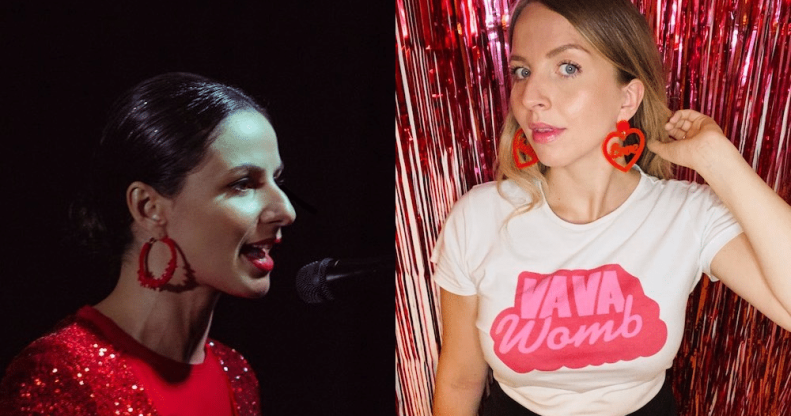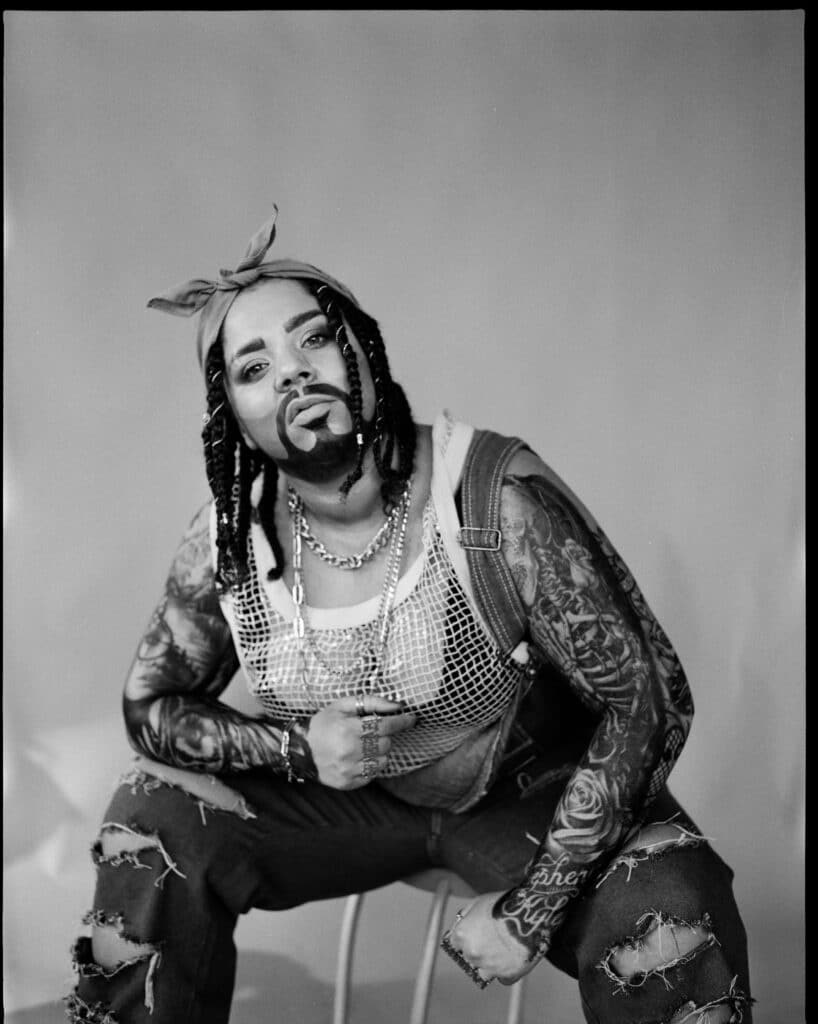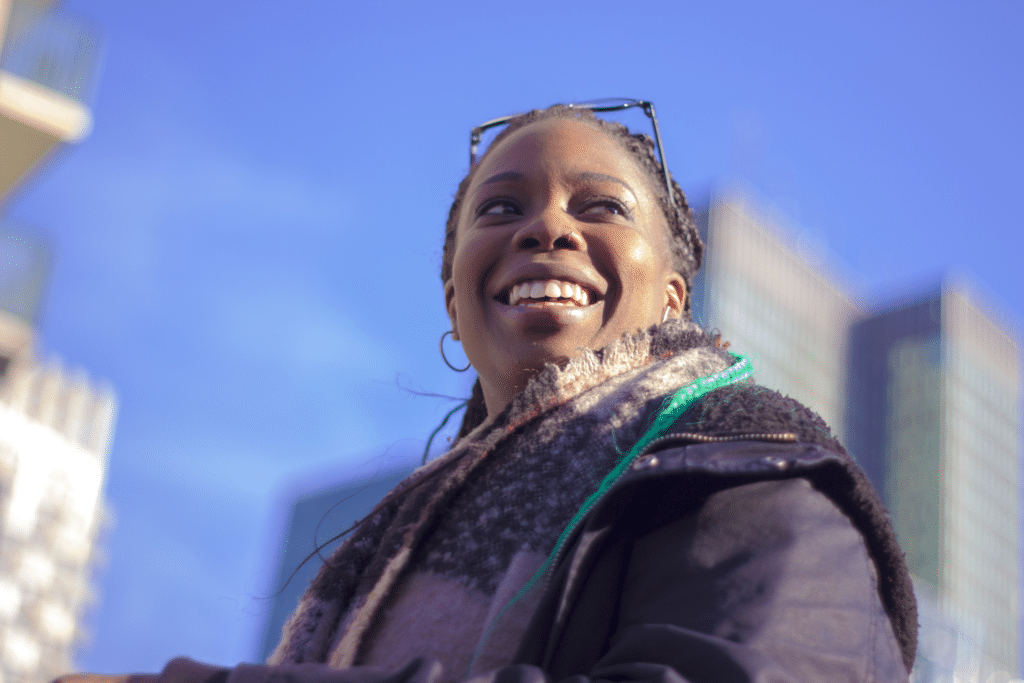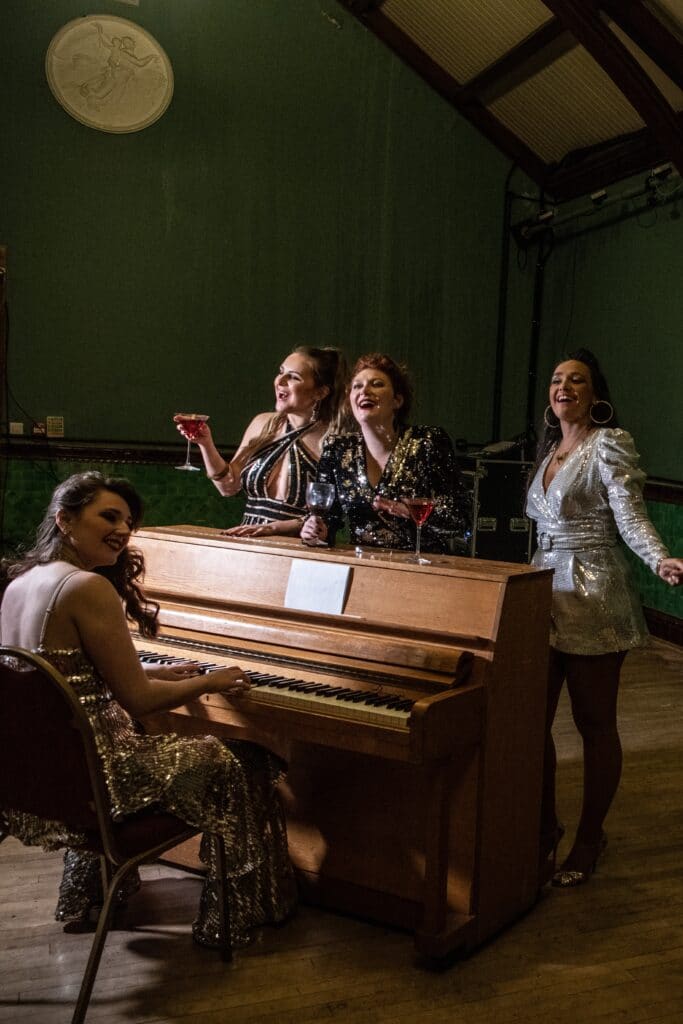Inclusive Vagina Festival wants people ‘shouting vagina from the rooftops’

Ellamae Fullalove (right) and Emilie Epperlein (left), founders of The Vagina Festival. (Alex Frances and Ellamae
A night of all things vagina, from celebrating gynaecological empowerment to sharing stigmatised lived experiences, is coming to London’s iconic Royal Vauxhall Tavern.
The Vagina Festival, which takes places on Wednesday (25 May), is the brainchild of Ellamae Fullalove, a writer, advocate for those with MRKH syndrome (a difference in sex development) and founder of Va Va Womb; and spoken word poet and activist Emilie Epperlein, who performs with the stage name My Hairy Vulva and Me.
Emilie grew up in a strict religious household, “where we weren’t encouraged to talk about our bodies”, she told PinkNews.
While studying psychology at university, she said: “I thought, ‘I’m gonna be really bold, and write my dissertation on vulva aesthetics, because that’s really going to shake things up, isn’t it?”
Her paper, which looked at the serious psychological and physical outcomes for a person who has a “damaging” relationship with their vulva, was published and Emilie congratulated herself.
“I published this paper and I thought, ‘Wow, I’ve done such a great job for feminist kind, I can sit back and relax.’
“Then a few months went by and I realised that people weren’t reading it. And that’s for a number of reasons: it was behind a paywall, it was written in this thick, scientific language… It’s meant to be a barrier. It’s meant to be complicated.
“I really wanted to be able to communicate my message that presenting vulva diversity in the world is really important.”
From there, Emilie found her way into the art world, to spoken word poetry, and eventually to The Vagina Festival.

Drag ting Shardeazy Afrodesiak, one the acts performing at The Vagina Festival. (Heather Glazzard)
Ellamae’s journey into the world of gynaecological art and activism began at 16, when she was diagnosed with Mayer Rokitansky Küster Hauser (MRKH) syndrome, which means she was born without a uterus or a vagina, and has never had a period.
“MRKH syndrome affects one in 5000 vulva owners, and it’s a difference in sex development, otherwise known as intersex,” she explained.
“A lot of people with MRKH have different feelings about the word intersex, but I’m more than happy to be in the bracket of having a difference in sex development.
“Personally, I feel like I’ve got a lot of privilege in my body because I’m a cis woman, I have ovaries and I identify as a woman. So I do think I’m more of an ally in that sense.”
Ellamae’s diagnosis of MRKH syndrome opened her eyes to issues of gender, identity, sex and diversity.
She continued: “I created my vagina myself through a process of vaginal dilation when I was younger, and I think the whole stigma of pleasure and sex and identity as a woman, and what being a woman meant to me, has just led me on this learning path.
“It’s opened my eyes and heart to so many different experiences with trans people, intersex people, my own experience infertility, what gender and identity means, and I think that’s just led me to being so passionate about understanding of people.
“As someone who identifies as a woman without a vagina and that doesn’t have periods, I felt like I can relate to and empathise with so many of those subjects, I’m part of a community of people that don’t fit that societal norm of what a body is supposed to be. The message of not all women have wombs and not all people with wombs are women is really, really, really important to me.”
The pair moved in the same feminist and activism circles and after meeting online, they “got their heads together” and created the first Vagina Festival, a Zoom event during lockdown in March 2021.

Spoken word artist Desree. (Harry Balding)
They were unsure of how popular the event would be, but it turned out to be roaring success.
“We had more than 450 people in attendance,” Emilie said.
“Originally we planned the space to encourage and celebrate vagina honesty and body empowerment, that was kind of the focus.
“But then it blossomed into something that was so much more. It became a night of solidarity, particularly after the tragedy of the murder of women and marginalised people at that time, and just this horrible reminder of the persistent threat of ongoing male violence.
“It was a moment where we were all coming together. And we had tears, humility, fierce advocacy from all over the world. People sharing these unfiltered stories, from experiences of having vaginal mesh surgery, to someone’s first orgasm. Very intimate, honest tales that we felt very honoured to hear.”
The event also managed to raise £2,400 for gynaecological cancer research charity The Eve Appeal.
At The Vagina Festival, ‘inclusion on all levels is absolutely essential’
Now, for the first time, The Vagina Festival will be happening in the flesh at London’s iconic LGBTQ+ venue, The Royal Vauxhall Tavern.
The inclusive festival will feature an incredible line-up, including award-winning spoken word artist Desree , “drag ting” Shardeazy Afrodesiak and comedy band Flat and the Curves.
There will also be an open mic segment, with performers carefully chosen by the organisers to ensure a diverse range of voices, experiences and topics.
Ellamae and Emilie were determined that the in-person festival would be as inclusive as possible.
“This is a feminist event,” said Ellamae. “For us, feminism is not feminism unless it’s intersectional.”
Emilie added: “I think inclusion for us on all levels is essential, absolutely essential.
“Diversity is nothing without inclusion, and that’s including people, all humans, people of all genders. And again, when we’re talking about vaginas, we’re saying not all women have vaginas. And not all people who have vaginas are women. That’s a very important message for us.”
The venue is wheelchair accessible, and the festival will have British Sign Language interpretation.
“We’re always looking to improve and we’re willing to hear feedback,” she said. “If there’s more we can do to make people feel more welcome, then we’ll do that.”

Musical comedy troupe Flat and The Curves. (Rah petherbridge Photography)
What’s so special about vaginas?
Having created careers and an entire festival around gynaecological anatomy, there is a question that both Emilie and Ellamae have pondered for a long time – what is the power of the vagina?
“The vagina for us, because it’s a hidden body part, it represents our hidden stories,” said Ellamae.
“There’s a misuse of language, and the word vulva is never really used, but that is actually everything on the outside. People have asked why we don’t call it ‘the vulva festival’ and our point is, it’s not really about just the vulva.
“It’s about the vagina for us… the untold area that’s actually like hidden, even though people use the word for everything, and I think that sort of summarises us – iuntold stories that are hidden, silenced.
“The word vagina itself is so stigmatised. We want to normalise it, instead of people calling things ‘private parts’ or’ downstairs’. The word ‘vagina’, it’s what the festival is about.
“It brings up stories of having periods or not having periods, or how the word vagina impacts a trans woman being born without a vagina, or someone like myself being born without a vagina. You don’t have to have a vagina to be at our festival, and it’s not a dirty, wrong or shameful word.”
“We included it in the title of our festival because we want to be shameless,” said Emilie.
“We’re gonna shout ‘vagina’ from the rooftops because there’s nothing to be embarrassed about.”
The Vagina Festival starts at 8pm on Wednesday, 25 May, at the Royal Vauxhall Tavern. Tickets are available here.

